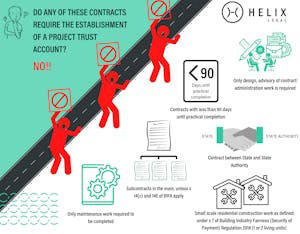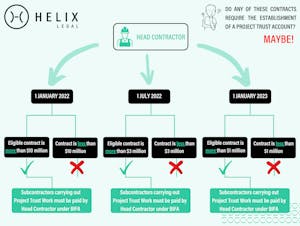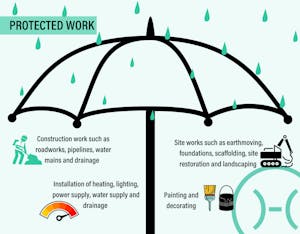Based on recent feedback I have received, it is apparent that many people are confused about the work captured and particular contracts impacted by Project Trusts required to be established under the Building Industry Fairness (Security of Payment) Act 2017 (BIFA).
In this article, I explain the circumstances and the issues a Head Contractor has to turn their attention to in deciding whether they are under an obligation to establish a Project Trust Account for the payment protection of Subcontractors on or from 1 January 2022 for all eligible or appropriate private sector contracts.
Contracts of this nature valued at $1 million or more have been captured by the Project Trust requirements since 1 July 2021.
Trusts limitations
I have previously expressed my concerns that Project Trusts fall short of a guarantee of payment to Subcontractors in other articles.
In the video below, you can see why I have concerns that failed Head Contractors may still leave unpaid Subcontractors in their wake.

FACT 1
Certain contracts will NEVER be captured by Project Trusts under the current BIFA.
In other words, the Head Contractor in certain contractual circumstances, will not ever have to think about deciding whether they have to establish a Project Trust and therefore pay Subcontractors under the Project Trusts provisions of BIFA.

Contracts, of the type outlined above, will never involve any type of Project Trust work as defined.
Examples:
- A contract solely for design work valued at any amount will never be captured if entered into at any time on or after 1 January 2022.
- A sophisticated small scale residential construction work contract, irrespective of the costs, for one or two living units entered into on or after 1 January 2022, will never be captured.
FACT 2
Particular contracts MAY be captured by Project Trusts.
Where a facet of ‘Project Trust work’ presents in a contract, the Head Contractor has to turn their mind to determine whether a Project Trust needs to be established. The question for Head Contractors is:
Will 50% or more of the contract price represent the carrying out of Project Trust work?
But what is considered ‘Project Trust work’?
It includes many types of work that are excluded from the definition of ‘building work’ such as earthmoving and excavating works, electrical works, the erection of scaffolding, and works performed by architects and professional engineers.
If the answer is NO to the above question:
That is the end of the Head Contractor’s deliberations.
However, if the answer is YES to the above question:
The Head Contractor has other matters to consider relating to the date of the contract and its value, namely:

FACT 3
Other Subcontractors doing ‘non-Project Trust work’ under a head contract requiring a Project Trust will also be paid under the Trust requirements.
I will do my best to explain this outcome.
Let me know if I fail or succeed!
Once a Head Contractor has decided the contract requires a Project Trust to be established, then there is good news for other Subcontractors working on the project who are not protected as a result of the carrying out ‘Project Trust work’.
Subcontractors carrying out any type of the more broadly defined ‘Protected Work‘ under a subcontract, will now also enjoy getting paid by the Head Contractor under BIFA.

I am of the view that the expanded protection for Subcontractors that occurs once it has been determined a Head Contractor must establish a Project Trust makes sense in two ways.
- The more Subcontractors afforded protection (be it with limitations as I have previously pointed out) via getting paid through a Project Trust is a good outcome.
- Administering a Project Trust contract similarly for all Subcontractors is a preferable outcome for the Head Contractor.
Final thoughts
As we come to the end of 2021, I want to thank all those who have read and kept up to date with all my articles this year. Statutory Trusts have been a big topic of conversation this year and it is important that you are aware of your obligations going into 2022. Reach out to our Compliance team at any time with any concerns or queries.
My good friend David Cahill started a Monthly Trust Update in 2021, and you can receive his final update for the year by filling in your details here. Be sure to subscribe and keep up to date with all things Trusts moving forward into the New Year, as changes to the private sector are happening as soon as 1 January 2022.
Not intended as legal advice. Read full disclaimer.


